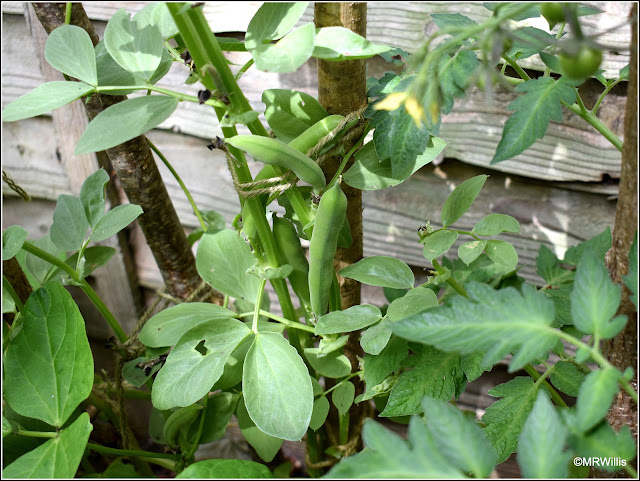My Brokali plants are just about ready for their first cut. This vegetable is a hybrid of the Calabrese-style broccoli and Chinese Kale. It produces heads that look like small heads of Calabrese, but the main attraction is the fat juicy stems.
 |
| Brokali "Apollo" |
Just like the other types of broccoli, when you cut the main heads the plant puts out lots of side-shoots, so I'm eager to get this done as soon as possible.
Growing next to the Brokali plants are my Kohlrabis.
 |
| Kohlrabi "Kolibri F1" |
I'd say they are now not far off the size of a tennis ball, and I'll be cutting the first couple of them in the next day or two. I'm reckoning that each one will make a serving for one person, so even my paltry 6 plants will be a worthwhile contribution to our veg intake.
I keep hesitating about picking the first of my Broad Beans. I'm always saying to myself "Don't pick them too soon, because you'll get a tiny yield." But then I don't want to leave them too long and find that they go floury. As with so many vegetables, deciding when to harvest is a matter of judgement, based on a number of factors, and I believe that quality is usually more important than quantity.
I expect to be reporting the first harvest of BBs any day now...
Back in the Spring I sowed and then planted lots of clumps of Onions, but was left with a few spares. I put these into a couple of black plastic crates, and they have now grown to a stage where they are useful as Spring Onions, and I have begun harvesting them as required.
Ironically, I have seldom been able to grow any Spring Onions from seeds sown for that specific purpose, but these are lovely!
In times gone by, onions were typically sown in Autumn / Winter and then thinned out in the Spring. Rather than waste the thinnings they were used as a salad ingredient. These days they are bred and grown specifically for this purpose. My mother-in-law calls them "Young Onions" not "Spring Onions", which is probably a better name, since these days you can buy them all year round .
Most of my tomato plants are setting fruit now, though none of them are anywhere near ripe.
 |
| Tomato "Sungold" |
I have decided that this year I am not going to let my tomato plants get as big as I usually do. Normally I stop them only when they have produced 5 trusses, but because of this they get very tall and I often have to spend a lot of time and energy keeping them upright, on account of the weight of fruit. This year I am only going to let them produce 4 trusses at most, and pinch them out when they reach the tops of their canes. Obviously this won't apply to the short bush-type plants. To be honest, last year we had too many tomatoes, and the freezer still contains a fair few tubs of tomato sauce!
Most of my cucumber plants seem to have settled in OK now, and are growing up their support poles.
Some of them have begun to produce flowers and little tiny fruits like this:
Once they get started these things grow very rapidly, so I don't think it will be long before I'm picking my first ones - especially as the most advanced ones are the types which are going to be used for pickling as cornichons.
I did have a couple of casualties with the cucumbers. I planted two of a type that produces white-coloured fruits, down at the bottom of the garden next to the "spare" Broad Beans. They never got established at all. They just withered and died. I'm not really sure why. When I dug them up to do a "post-mortem" I noticed the roots were very small, so I think maybe a pest of some sort had had a nibble of them. Fortunately I have two more plants of the same variety, and I'm currently contemplating where to plant them. I don't want to put them in the same place, just in case the suspected pest is still lurking there.
My potato plants are all looking very pale now. Their foliage is beginning to die down, so I'll be harvesting another pot of them every few days over the next month or so. In fact this will be the most significant early summer harvest for me, and I'm hoping for bigger yields each time as the the tubers swell.
That's it for now, but expect to see photos of harvests in my next post!










We are living on calabrese at the moment, eating them before they run to seed. We haven’t as much variety as you as we are just planting some of the things that you nearly have ready.
ReplyDelete